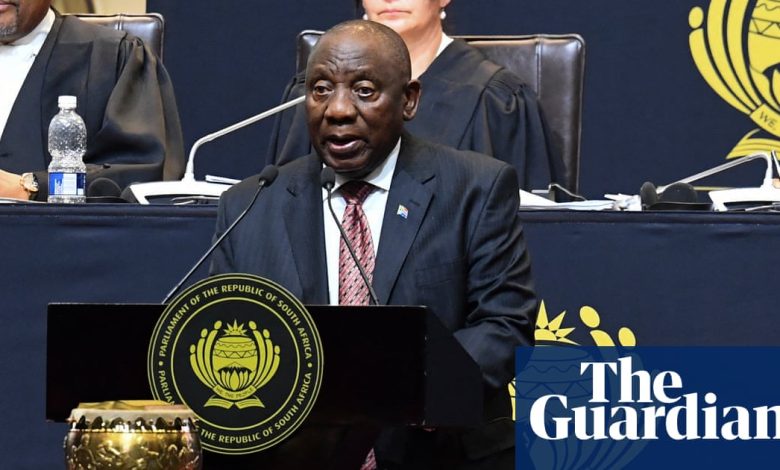Cyril Ramaphosa re-elected as South Africa’s president | South Africa

[ad_1]
president of south africa Cyril Ramaphosa was re-elected by the deputies for a second term, hours after his African National Congress and on The Democratic Alliance (DA) agreed to form a coalitionsetting aside their rivalry in a historic governance pact.
Ramaphosa won the vote late on Friday against Julius Malema, leader of the far-left Economic Freedom Fighters, winning 283 votes to Malema’s 44.
Earlier in the day, the pro-business prosecution said it would vote for Ramaphosa as part of an agreement with the former liberation movement to form a unity government.
Ramaphosa’s centrist preferences eventually won over left-leaning factions of the ANC, which wanted to strike a deal with breakaway parties that support nationalization and the seizure of land from white farmers. The deal came amid criticism that the prosecution was supporting the interests of South Africa’s white minority, something it denies.
ANC lost its parliamentary majority in the May 29 election for the first time since coming to power in 1994 at the end of apartheid. His vote share collapsed from 57.5% in 2019 to 40.2% as supporters defected to breakaway parties amid chronic unemployment and deteriorating public services.
The DA, which received almost 22% of the vote, will back Ramaphosa’s election by MPs for a second term, while its MPs will also vote for the ANC speaker of parliament in exchange for the deputy speaker position, its leader John Steenhuizen told a news briefing the press.
“Today, the DA becomes the party of the national government,” Steenhuisen said after lawmakers were sworn in at a convention center in Cape Town while parliament buildings were still being renovated following a 2022 fire.
“Through their votes, people have made it clear that they do not want any one party to dominate our society. People also told us that the time for finger-pointing is over and that the time has come for a new policy of cooperation and problem-solving.
An ANC-DA coalition was favored by big business and international investors, with Ramaphosa, 71, expected to continue trying to push through policies such as allowing the private sector to generate renewable energy, which contributed to a drop in blackouts of electricity.
Talks will continue after Friday on policies and cabinet positions, Steenhuisen said, adding that the two-week period after election results that the constitution requires to elect a president is not long enough to reach a full coalition agreement.
A “Declaration of Intent” signed by the ANC and DA includes a commitment to “merit-based, non-partisan and professional public service”. The DA has long criticized the ANC for appointing its supporters to public sector positions prominent in the South Africa as “cadre deployment” claiming to promote corruption.
Two smaller parties, the Inkatha Freedom Party (IFP), a Zulu nationalist party, and the Patriotic Alliance (PA), which wants to bring back the death penalty and deport illegal immigrants, also said they would join the government.
The inclusion of the IFP, which received 3.8% of the vote, was seen as a way of deflecting criticism of the ANC for working with the white-led prosecution. The PA, led by self-styled reformed bank robber Gayton McKenzie, received 2% of the vote and has its base of support in South Africa’s colored communities.
The ANC’s vote share collapsed largely due to the new uMkhonto weSizwe (MK) party, named after the ANC’s armed wing during apartheid. He came a surprising third in the election with 14.6 percent of the vote, just six months after being launched by former president Jacob Zuma, who has been bitterly feuding with Ramaphosa since he was forced to resign the presidency in 2018.
The MK party, which wants to replace constitutional democracy with parliamentary supremacy, boycotted the opening of parliament after a legal challenge to the election results was rejected by the country’s highest court. She has said she will not work with the ANC as long as it is led by Ramaphosa, who has said potential coalition partners must respect the constitution.
Meanwhile, the far-left Economic Freedom Fighters (EFF), who were sworn in as MPs in their trademark red overalls, some with helmets and rubber boots, were among the parties that rejected Ramaphosa’s call to join a Government of National Unity (GNU).
Malema, the EFF leader who founded the Marxist party in 2013 after being expelled from the ANC while its youth leader, said he would not join a government with the “neo-colonial” DA, which he called “our enemy”.
Some ANC politicians and supporters favored a coalition with the EFF and MK or both, seeing them as political and ideological relatives.
However, Ramaphosa’s call for the GNU was in line with his cautious political approach, some analysts said, and positioned the ANC as inclusive, with parties that did not join excluding themselves.
[ad_2]




